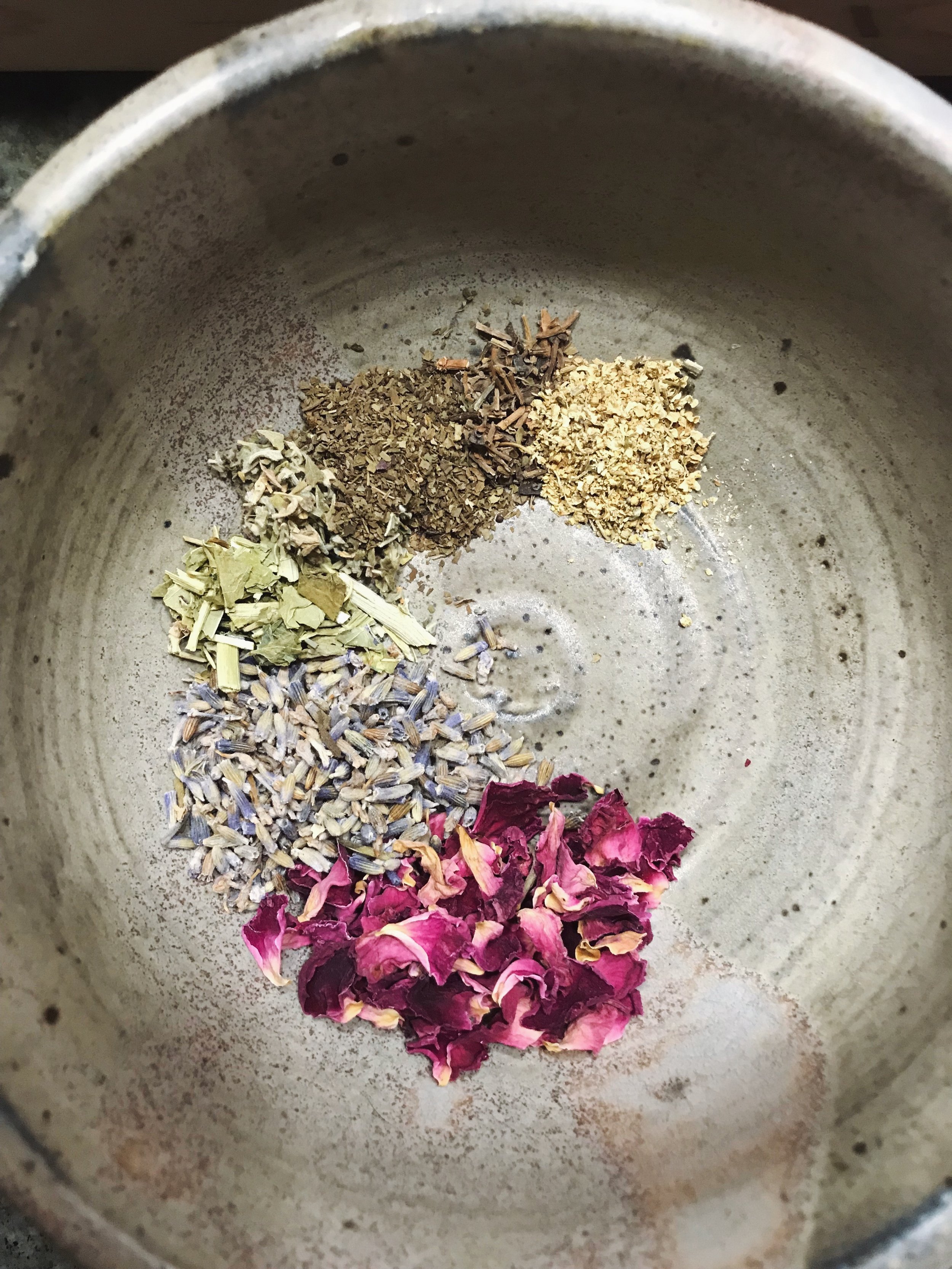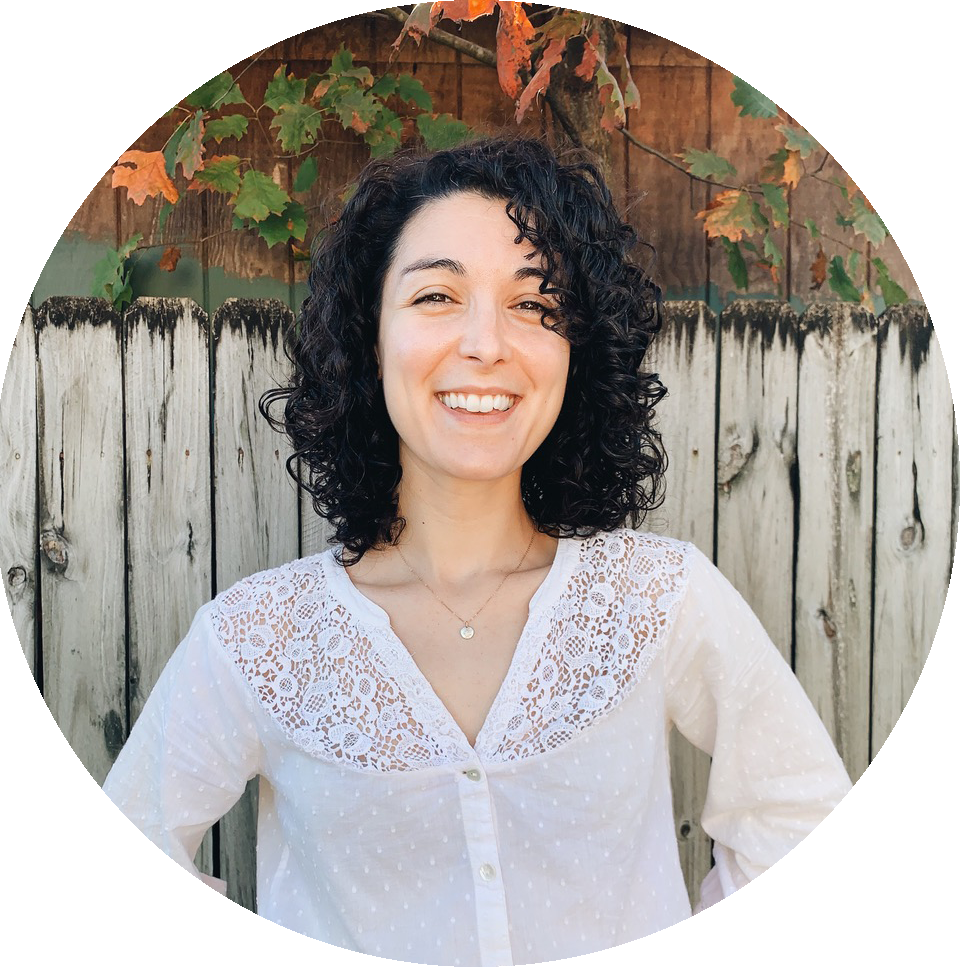Dreamweaver, Tea Recipe by a Hobby Herbalist
/Dreamweaver
A tea crafted by ratio, scalable to any recipe size.
Dreamweaver is a floral, heavy tea that assists the Sandman in weighing you down for deep, restful sleep. Comprised of a collection of herbs, leaves, and flowers with varying properties, the primary effect of this brew is a smooth and seamless dream experience.
As someone who struggles with sleep, I find that there is not one cause but a slew of factors that can be remedied with herbs. A few common sleep disrupters:
Excess screen time tricking the brain into thinking it's still daylight
Daily stressors that turn the worry wheel late into the night
Jagged dreamscapes that leave the mind weary to relax
Racing heart and stressful blood flow when laying horizontally
Disrupted hormones due to time schedule, diet, physical activity, and genetic triggers
Restless spirit with consciously unanswerable questions
Light, superficial sleep caused by substance excess (alcohol, nicotine, caffeine, sugar) and organ malfunction
See the Traditional Chinese Medicine clock by Lily Choi Natural Healing for deeper understanding of the organ cycles.
Without thinking, I arranged these herbs cycically according to their color, amount, and synergy.
This helped me to experience the tea with all of my sense (especially scent and sight) as I blended the components. To make this recipe scalable from one cup to infinity, I crafted my blend using the 'parts' or ratio method.
Meaning, one part rose, half part passionflower, etc.
Dreamweaver Recipe
6 parts Rose Petals [may substitute hips, not buds]
4 parts Lavender Flowers [do not substitute essential oil]
4 parts Elderflower
2 parts Passionflower [reduce by half for a less bitter tea]
2 parts Chamomile [optional, as this is a common herbal allergen]
1 part Bramhi Leaf
1 part Tulsi, Holy Basil
1 part Damiana
Originally, I made the recipe using fractions of teaspoons.
Working in this small amount helps me to craft a proper cup or pot serving and then scale appropriately. This tea is steep 4 - 8 minutes at 2 tsp per eight-ounce cup of boiling hot water. The longer this tea is steeped, the stronger the flavor will become and the heavier your sleep state may become.
Heaviness in sleep is positive, despite its burdensome sound. The way the Sandman pours sand over our eyelids to keep them closed is a similar weighty effect this tea has on your limbs. You become heavy, connected to your bed or sleeping mat. Your consciousness becomes less flighty, your thoughts less active.
You sink, melt, settle into your space.
About the Herbal Components of Dreamweaver
This information I have garnered through years of experience but will cite my latest muse: Herbal Therapeutics by David Winston, RH (AHG) as a source for filling in the gaps of my knowledge.
Each of these elements were chosen based on my interpretation - intellectually and intuitively - of their properties. While all facts have been checked and tested against published research (see above source), the translation is my own.
Rose Petals
The gentle floral mother, soothing the weariness of heart, easing the flow of pulse, warming the senses.
Lavender (Flowers)
Quieter of the mind, easing your consciousness into the wading pool beneath the rising moon. Before you drift along the river into dreams, you are submerged in cleansing, cooling energy which loosens stagnancy throughout your mind-body. Lavender works synergistically with Holy Basil and Damiana to prime your mental state for sleep.
Elderflower
The library of knowledge, experience, and universal consciousness may exist within the dainty petals of this flower. As a whole plant, elderflower synergizes your higher consciousness with your human vessel, elevating your immune system and promoting movement of stagnant energies.
Passionflower
Said to be of feminine energy but overall the source of calm at the center of ones' being. In Western terms, passionflower is antispasmodic and a mild sedative, making it a prime component of the stilling and weighting effects of this tea.
Chamomile
Chamomile is as common as you or I and its universality to establishing common ground in your mind-body. Where rampant thoughts of the material plane may keep you busy into the wee hours, Chamomile's grounding and infinite impact on our mental state are a soothing reminder that "this too shall pass."
Bramhi Leaf
Leaves of the Bramhi plant are revered for their channeling of the Divine. Working synergistically with Chamomile to appropriately shrink the seeming overwhelm of the day's tribulations, Bramhi helps us find ourselves in the Divine through universally-conscious dreaming.
Tulsi, Holy Basil
A tonic of the brain and the nervous system, specifically calming the jitters and leftover surges of inspiration. For those with mental for or foggy dreams, Holy Basil displaces the mist and allows the curious mind a clear pathway to the answers it seeks in the great beyond.
Damiana
Damiana is the connection of the Holy Dream Trinity (in my opinion) as it is the dream inspiration component. Adding to the stillness of the body and elevating the mind from any depressed or distressed state, Damiana is your key to your deepest dreams.
Enjoy a cup no less than thirty minutes before bedtime.
Tea of any kind carries diuretic properties and the most common disruption to sleep is simply getting up to use the toilet. Follow your cup of tea with a glass of room temperature water and avoid any cold beverages for the rest of your evening.
To support your dream practice, consider implementing a new habit or two:
Keep a dream journal and writing utensil by your bed, recording your dreams first-thing when you awaken, before seeing your phone or turning on any overhead lighting.
Practice stillness before and after sleep, at least five minutes, to prepare your mind for its journey into the dream-beyond and to allow it time to reacclimatize before you start a new waking morning.
Avoid caffeine, alcohol, nicotine, and sugar no less than two hours before bedtime.
Practice light stretching without inversions before sleep to move any stagnant or collected energy from your joints that could disrupt your rest.
Consider eliminating screen time from your nightly routine at least thirty minutes before bed and no less than fifteen minutes after waking. This allows your eyes (which are human, after all) to adjust to natural lighting cues which [biologically] communicate to your body to begin certain internal processes.
Thank you for reading this whole post, as I did not intend for it to be this in-depth!
The evening I made this tea, I felt inspired to photograph the process. What I've come to realize is that when I am passionate about something... I can't keep quiet about it!
If you have questions about herbs, teas, or am curious about how I source my materials, reach out in the comments!
Until next time... dream deeply. 🌙
This article originally appeared on my Steemit Blog.






